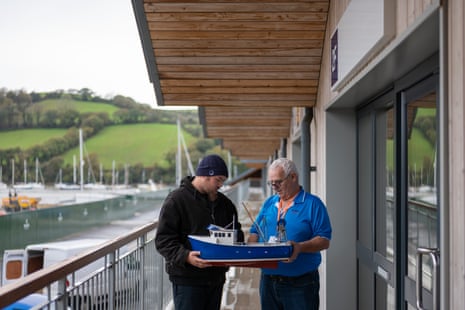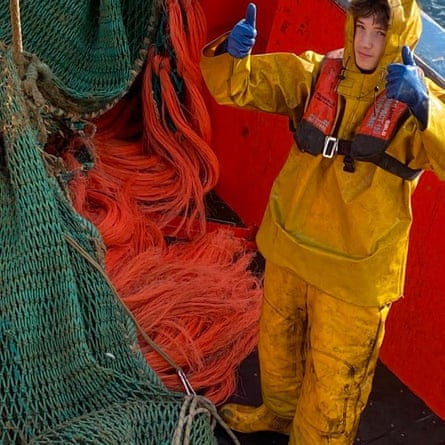Alfie Steer has chosen a different path to his friends. While they are studying for exams and filling out university application forms, the 17-year-old is setting his alarm for 2.50am and heading out to sea. By 5am, he is hauling crabs from the decks of his father, Alan’s, trawler.
“Yes it’s rough and wet – and rolly in winter – but I love it,” he says with a grin. “I’m the only one out of my friendship group who has a full-time job. That’s a good feeling. I get a wage, and it’s a job I might do for the rest of my life.”
Steer is part of a pioneering new scheme: England’s first modern fishing apprenticeship, launched earlier this autumn in south Devon. The result of years of work from industry leaders, the apprenticeship is seen as a vital part of efforts to ensure there will still be a British fishing industry when Steer is older.
From declining fish stocks to a recruitment crisis exacerbated by Brexit, the industry faces many difficulties, and enticing young starters into a physically demanding job isn’t easy at the best of times. So to draw them in, new apprentices are offered pay, a relationship with a specific employer and training for skills they could use throughout their lives.

The 14 apprentices in the programme divide their time between working on boats and courses at a college on the banks of the River Dart. Here, in a space equipped with practice boats and rooms ready for net-making and rope work, they learn the practical skills of the trade.
The lead tutor, Mark Day, a former fisher himself, says the teaching is aimed at re-skilling the whole industry. “There are two main practical elements to our course: rope work and net-making. A lot of time is given to these skills,” he says.
“In the past, there would have been people on board who could do this, but with the pressures the industry is under now, there just aren’t as many crew on board. So these young people won’t be as experienced as other crew, but they will be in the top 10% of deckhands in terms of the skills we have taught them.”

The boats that students are sent to vary widely, from family crabbers like Alan Steer’s to bigger trawlers. Back on land, students get a chance to debrief and talk through the experience before starting on practical work.
Adam Kennedy, 21, has – to the surprise of those who know him – swapped a job in retail for a new career in fishing. “I was working in Sainsbury’s when I saw the advert,” he says with a laugh. “I’d only been on boats on holiday, and I live in Birmingham so it meant leaving all my family behind to come here to Devon.
“When I told my family and friends they couldn’t believe it: I’m quite a shy person. They were all surprised.”
But he is already hooked on his new life. “I love the excitement and adrenaline rush of being out at sea. I’m working on quite a big boat: a scalloper. The first trip was tough, four or five days out. But you are so tired at the end, you fall asleep straight away. It’s a funny experience – when I tried to pick up the fish, they kept flopping out of my hands. I didn’t mind it, it was great being outdoors.”

Alan Steer, Alfie’s father, is a third-generation fisher who grew up inBeesands, a Devon fishing village where family businesses have now all but died out. “Growing up, I learned a lot from my father, going out crab-fishing, which was fantastic. But studying at college, you can learn about nets, how scallop-dredging works, how bigger boats navigate. That is what the apprentices will get.”
This broader understanding of the industry is what young people need now,” he says. “When I started working on sustainability, I didn’t know how much I didn’t know until I met people in other types of fishing, as well as scientists and policymakers. Then we could all start to think how to solve each other’s problems.”
Support for the apprenticeships has come from a wide range of businesses linked to fishing, from big trawler owners to supermarket chains. Morrisons gave £100,000 to fund the training of 10 of the new apprentices, who will be tied to the South Western Fish Producer Organisation.
Katie Hooper, an adviser to Seafish, the industry skills board, says the industry wants more young entrants. “We have lost foreign workers since Brexit. To come now, they would need a skilled worker visa, and that’s costly.

“But it’s also the mentality that changed around fishing. We do still have fishers – like Alfie – who had a grandad and dad who did it, and who have always known they wanted to do it too. But now young people are, on the whole, in school until 18.”
“Fishing is a lifestyle. Yes, it’s demanding, but you are outdoors, it’s skilled, it can be very rewarding and there are a lot of chances for career progression.”
Andrew Pillar, director of Plymouth-based trawler company Interfish – sponsor of one of the apprentices – points to the large sums being invested in UK fishing as a sign of optimism. “We are positive, and we are in a vessel renewal phase. Fishing has the unique ability to reach into coastal communities and provide well-paid skilled employment.”
Some of that investment is going itowards changing the traditional experience of fishing boats as being difficult places to work, sleep and eat. Some are now equipped with TV, wifi and comfortable bedrooms. One apprentice, Archie Cox, is on a new vessel. “It’s only six months old, and recently had £4.7m spent on it,” he says. “It’s got aircon, nice comfy beds, wifi, everything you need. It’s brilliant.”

Day, the tutor and former fisher, laughs at how far things have changed in fishing: “Satellite TV on the boats! My dad would spin in his grave.”
He adds: “We are instilling in these young lads that the regulations are there to create a sustainable future for fishing, so that their career won’t be over when they are 30 because there are no fish left.
“Our industry has always had challenges. I remember during the miners’ strike when there wasn’t enough fuel for the boats. And with Covid, we thought that was it for fishing.
“Yes, Brexit has made it harder to hire from overseas – but foreign crews were only ever a short-term answer. We had kids apply to this course from all over the country: Birmingham, Liverpool, Newcastle. We never thought we would have so many applicants – it was gobsmacking to get 150 for 14 places.”
“I hope to see them all come back here to do their captain ticket in a few years.”
Avakin Life Avacoins Hack for Fashion Enthusiasts
Unlocking Free Bingo Blitz Credits: A Comprehensive Guide
The Science of Spins Farming in Coin Master
9 easy ways to get free primogems in genshin impact one esports
ZEPETO Zems Generator Risks: The Truth
match masters free coins free boosters free gifts daily links
TikTok Coin Hacks: The Complete Guide
Brawl Stars Gems Farming Strategies: Success Tips
unlimited cheat free dragon city gems generator
family island hack cheats readme md at master github
how to get diamonds in hay day tips tricks youtube
download get free diamond litmatch apk for android apk4k
moonrise cheats ios iphone ipad gamefaqs gamespot
pull the pin tips cheats tricks to complete all levels and earn
gems hack evony kings return free items daily cheats rewar
dice dreams free rolls collect daily coins and rewards 2023
Free TikTok Coins: Your Path to Fame
TikTok Coin Hacks: The Complete Guide
Tout ce que vous devez savoir sur le hack des pièces TikTok gratuites
The Future of Chatting: Free Coins in LivU Video Chat
Coin Master Free Spin Generators: Fact or Fiction?
Free Avacoins in Avakin Life: Where to Find Them
Unlimited Credits in Bingo Blitz: Myth or Reality?
The Secret Formula for Spins Generation in Coin Master
genshin impact codes guide get free primogems and mora




